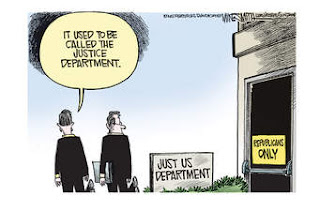The Taste of Truth
“People often claim to hunger for truth, but seldom like the taste when it's served up.”
George R.R. Martin
Commentary: Caribbean livelihoods and climate change resilience: Do the benefits outweigh the costs?
 |
| READ |
The Underground Girls of Kabul: In Search of a Hidden Resistance in Afghanistan
ANATOMY OF FAILURE: Why America Loses Every War It Starts
African Ways
 |
| ISIS |
 |
| INFRASTRUCTURE |
Farmers join new reg-reform group: Farm groups have partnered with the National Association of
Manufacturers and North America's Building Trades Unions to form a new group
called the Coalition for Regulatory Innovation, which will push for reforms to
straighten out the regulatory delays and turf battles that hold up
infrastructure projects. The farm groups that have signed on include the
Colorado Farm Bureau and the New Mexico Farm & Livestock Bureau. [POLITICO's Morning Agriculture, October 3, 2017]
The White House invited members of the infrastructure
working group of the Congressional Problem Solvers Caucus over Thursday,
following a meeting the group had with Gary Cohn last
week. According to one of the attendees, lawmakers renewed their call to
combine an infrastructure package with a tax overhaul, even in the face of
administration resistance. Rep. Elizabeth Esty (D-Conn.) said she still
thinks it could happen - and that it could help turn the tax package from a
partisan food fight into a unifying cause with overwhelming support.
IS THERE SOMETHING IN THAT BIG BLACK BAG FOR ME? The
GOP tax overhaul plan introduced Thursday would remove a key incentive for
employers to offer commuter tax benefits. While employers would still be
allowed to either give employees untaxed transportation money as a fringe
benefit or to deduct it as pre-tax income from their paychecks, the businesses
themselves would not be able to write off the expense. The cap for the transit
and parking subsidies (or pre-tax contributions) would still each be $260 per
month for 2018. Several well-positioned urban Republicans, including
Reps. Pete King of New York,Barbara Comstock of Virginia and Mike Bishop of Michigan, worked hard to keep
the benefit. And... The
legislation would also nix private activity bonds. That provision is likely to
irk localities that use them for infrastructure upgrades. (POLITICO's
Morning Transportation, November 3, 2017)
USDA
Invests in Rural Electric Infrastructure: Perdue
announced that USDA would invest $2.5 billion in rural electric infrastructure
in 27 states. This funding, in the
form of loans through USDA Rural Development's Electric Program, will "help utilities and cooperatives build new
transmission and distribution lines, upgrade networks and facilities and better
manage the power grid, " Perdue said. (POLITICO's Morning Agriculture,
November 3, 2017)
 |
| HEALTHCARE |
 |
| EDUCATION |
 |
NEWS ITEMS "lost in the jungle" From Charlotte’s first female black mayor to a $10 million state Senate race: Here are all the Election Day firsts |
 |
| ENVIRONMENT
GREENS PURSUE NOVEL NEW SUIT AGAINST TRUMP
CLIMATE ACTIONS: A Philadelphia-based environmental group
has sued the
Trump administration seeking to reverse various climate-related regulatory
rollbacks, including the Clean Power Plan repeal and withdrawal from the Paris
agreement. The Clean Air Council argues in its lawsuit that the rollbacks
amount to a violation of all Americans' constitutional right of due process
because any action that contributes further to climate change endangers
"the lives and welfare of United States citizens." The administration
"is relying on junk science to wage a war on facts," underscoring
"reckless and deliberate indifference," the suit continues. If this
sounds familiar, it's because a group of kids and climate scientist James Hansen
are pursuing a similarly broad constitutional challenge to the federal
government on climate change in an Oregon court. That case is on hold while the
9th Circuit mulls whether it can move toward a trial. [POLITICO's Morning Energy. November 7, 2017]
Act H.R. 3043 (115) revamping the permitting process for hydropower
projects. "This bill won't change outcomes or environmental standards.
Instead, it will speed up the relicensing process and save time and
money," bill sponsor Rep. Cathy McMorris Rodgers said in a statement. Twenty-six Democrats backed the
measure, while three Republicans voted against it. [POLITICO's Morning Energy,
November 9, 2017]
When I was narrating Sonic Sea, NRDC's breathtaking,
Emmy-winning film about threats to marine life from industrial noise, I spent
countless hours watching underwater footage.
And it probably won't
surprise you to learn what captured my heart the most: Whales. Dolphins. Seals.
Sea lions. Manatees.
These remarkable marine mammals surprised me again and again with their beauty and intelligence, and their sense of humor. So when I heard that Congress is considering legislation that would gut the bedrock conservation bill that protects marine mammals in U.S. waters, I knew I had to speak out. Join me and tell your representative in Congress to say NO to weakening the landmark Marine Mammal Protection Act to fast-track oil and gas drilling. Forty-five years ago, the Marine Mammal Protection Act was created in response to the American public's deep connection to our most majestic marine life. Now, anti-environment members of Congress are doing the oil and gas industry's dirty work, and pushing legislation that would:
When I watched oil and gas
companies using high-powered air guns to map potential fossil fuel deposits
beneath the ocean floor, I saw how devastating these activities can be to
marine life. NRDC and
the NRDC Action Fund have been fighting to protect whales and dolphins against
these kinds of threats for decades, but this could quickly change if Congress
strips the Marine Mammal Protection Act of its core provisions.
Together, we can make sure lawmakers hear our message loud and clear. Thank you! Sincerely, Rachel McAdams Oscar-nominated actress and narrator of Sonic Sea
“There’s no bigger impact on the environment
than brown coal mining, and we’re the world champion,” said Dirk Jansen, a
leader of the local chapter of Friends of the Earth in Germany’s coal heartland
of North Rhine-Westphalia. “If we want to stop climate change, we have to start
here.” [
All across the Western United States, wolves,
mule deer, elk herds, grizzlies, and more follow incredible migrations across
hundreds of fences, mines, and highways in the Western plains and mountains—all
to reach the critical feeding and breeding grounds that they call home. The animals teach their behaviors to
successive generations—and have followed migratory pathways for decades, no
matter what humans did or built around them. Their journeys, often hundreds of
miles, are critical to their
survival. But now these animals are in grave danger, as
their migratory routes are threatened by habitat loss and climate change. In
Colorado alone, mining and deforestation destroy a football-field-sized piece of
pristine wilderness every
two-and-a-half minutes. If
we don't act now, we could be the last generation to witness an elk herd
migration in North America! Protecting
wildlife habitat is one of the most important tasks in conservation today.
That's why The Nature Conservancy's scientists and researchers are hard at work
in the American West, identifying and protecting vital migratory routes to help
save the animals that depend on them. We've
developed forest restoration solutions for more than 100,000 acres of Montana
forests, preserving
prime habitat for wide-ranging carnivores like grizzly
bears and Canada lynx. And consider the success we're having in Wyoming, protecting 3,802 new acres of
vital migration corridors in the Little Snake River Conservation Priority Area. Our scientists know how to achieve success,
but there are still more migration routes to discover and protect, more
wildlife to save, and more work for them to do. In Idaho, development is
threatening key habitat and migration corridors for iconic animals like grizzly
bears in the Selkirk, Purcell and Cabinet mountains. And in Colorado, if you
walked in a straight line through the woods, you would reach a road roughly
every 20 minutes! -- Dave Strauss,
Director of Membership The Nature Conservancy
From the Atlantic to the Pacific, the ocean
unifies our world. And protecting it is a cause that affects all of us. Attending the recent Our Ocean Conference in
Malta brought our collective work into focus as I met with international
leaders who fight for the ocean in their corner of the world every day. As we addressed challenges that threaten the
health of our ocean, I drew inspiration from the leading scientists, global
companies, diplomats and others who are turning science-based solutions into
action. Among the most important topics
we discussed was the growing threat of ocean acidification. As the ocean absorbs more carbon pollution,
the water is becoming more acidic. It affects the way animals (especially
shellfish) grow and survive, which hurts the animals that eat them and the
people who fish for them. If you live near a coastal community, ocean
acidification could directly affect you or your neighbors. But here’s the good news. Ocean
Conservancy is on the front lines of ocean acidification outreach and research.
We work tirelessly to spread the word about the problem and bring together key
stakeholders to find answers to hard questions.
-- Susan Ruffo, Managing Director, International Initiatives Ocean
Conservancy
Today, Trump's Department
of the Interior proposed the largest expansion of offshore drilling ever --
expanding drilling off America's coasts, including in the Gulf of Mexico, the
Atlantic Ocean, the Pacific Ocean, and the Arctic. Trump isn't doing this
to please his constituents -- in fact, governors of states like North Carolina,
South Carolina, Virginia, New Jersey, Maryland, Oregon, and California have
explicitly opposed drilling off their coasts. Instead, this is a blatant gift
to the oil companies that have bankrolled his campaign and staffed his
administration.
If Trump's plan becomes reality, spills will be inevitable -- and devastating. In 2010, the Deepwater Horizon oil spill damaged 1,313 miles of coastline. That's more than the entire length of California, or half the Atlantic coast. Offshore oil spills happen frequently, devastating marine environments, commercial fishing industries and tourism businesses. Even without spills, offshore oil causes climate pollution. At a time of increasing devastation from climate change, our government should not be doubling down on its investment in fossil fuels. This gift to Big Oil and Gas is an attempt to overturn protections put in place for the Arctic and Atlantic Oceans, and hits reset on the plan the Obama administration completed in 2016. At that time, the activists like you -- over 3.3 million people! -- spoke out in support of protecting our coasts. Thanks for all you do to protect our oceans, Lena Moffitt Senior Director, Our Wild America Campaign Sierra Club |
NOTE: The news sources here vary. Not all sources have the same credibility, but in an effort to share some different perspectives, they are included here. This compendium itself cannot claim to be unbiased. Please take into consideration where these different perspectives originate in assessing their value. Thank you
NOTE: I have no official connection to any organization from which information is shared.. Occasionally, I post informational material and/or an opportunity to donate or join as a "community service" announcement. These again are shared for their varying perspectives.
Any books listed are random or topic-related to something else in the post. Think of these as a "library bookshelf" to browse. They are shared for informational or entertainment value only, not as being recommended










Comments
Post a Comment